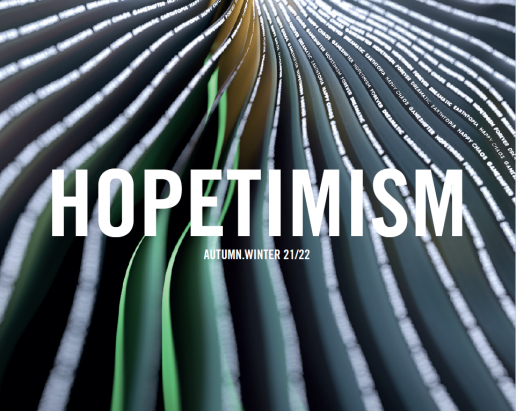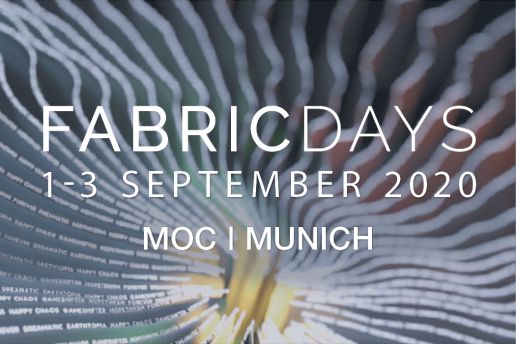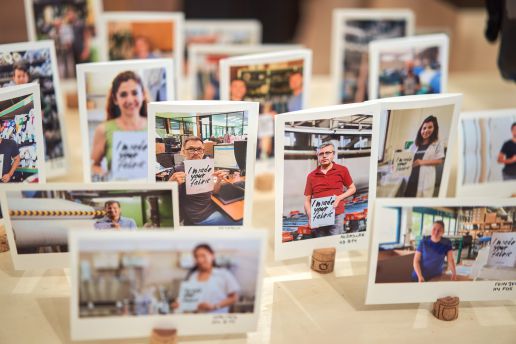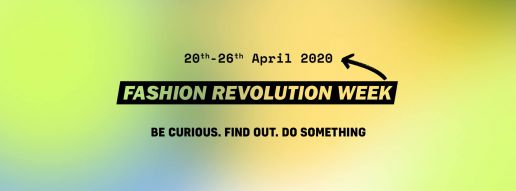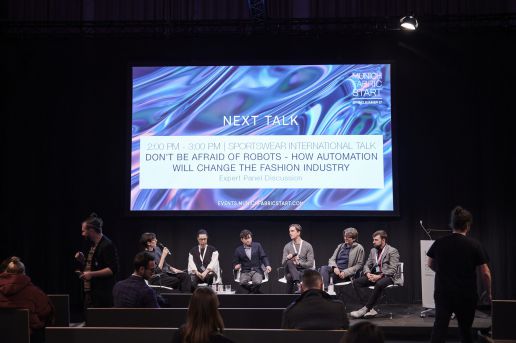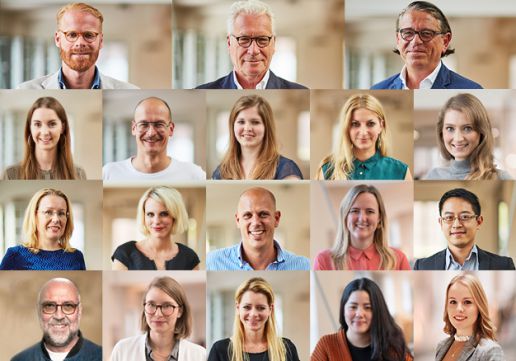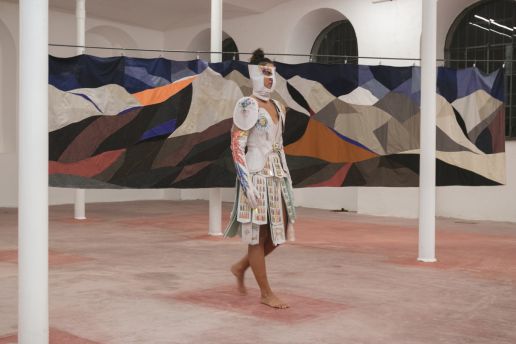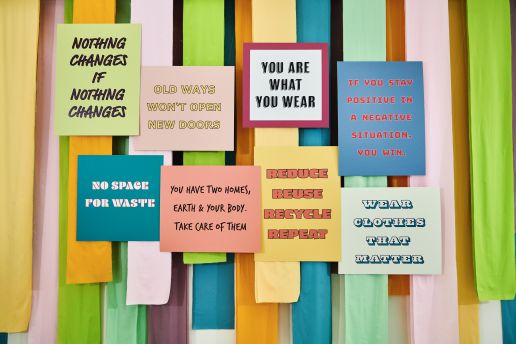Munich Fabric Start
Hopetimism – What FABRIC DAYS Stand For
HOPETIMISM – THIS IS WHAT FABRIC DAYS STAND FOR
This year demands the highest flexibility and creativity from the whole fashion and textile industry. As a long standing partner of the industry, we have taken up the challenge to offer a creative environment for efficient work and inspiration also this season, adapted to the new circumstances: The focussed business trade fair FABRIC DAYS.
FABRIC DAYS take place from 1 – 3 September 2020 at the MOC in Munich. In the four fully booked halls on the ground floor of the MOC, around 300 German and European exhibitors will present their new developments in 5 segments for Autumn.Winter 21/22 in around 700 collections.
Visitors get the chance to meet their suppliers and partners in person again at FABRIC DAYS and use the three fair days in Munich for their collection design, exchange and inspiration. As well as the select, trend setting portfolio, FABRIC DAYS will also offer a meaningful trend forum following the seasonal theme “HOPETIMISM”.

.
HOPETIMISM represents a new zeitgeist in the textile and fashion industry.
A spirit which embraces hidden feelings, visionary thoughts, progressive and pragmatic action and new realities.
HOPETIMISM combines personal and global hope with individual and holistic optimism: A title for the present as well as the future which carries both strength and softness.
.
Get inspired by our HOPETIMISM TREND FORECAST – Order the booklet now!
Discover the 5 HOPETIMISM trend themes and colours in a new format adapted to the changed circumstances. The TREND FORECAST booklet combines a mix of fashion trends, sustainability and innovation with impressions from art, culture, architecture and design.
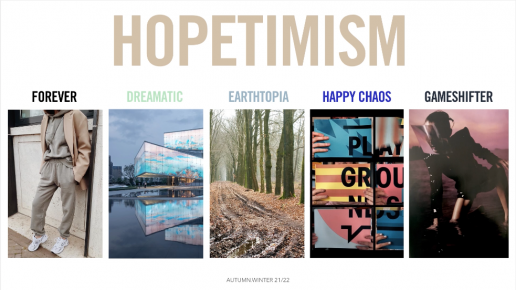
This HOPETIMISM spirit can only be pursued together: in the cooperation of our exhibitors, visitors and us, the organisers of FABRIC DAYS. Among the list of confirmed and “hopetimistic” exhibitors are many international premium suppliers, who will showcase a broad product range. Thanks to established partnerships with leading textile agencies such as Berner & Sohn, Max Müller, LOOMseven and Püttmann, many collections from European manufacturers will be shown exclusively at FABRIC DAYS this season.
The participating Fabric manufacturers include for example Lisa, Yünsa, Henitex and Davaris. In the Additionals area, Peter Büdel, Shindo and Varcotex will present their latest developments alongside others. Lica Design Studio, Circleline and Design Studio Fluxus are three of the exhibiting Design Studios. Lagoon, United 3 Fashion and Dimis Fashion Group are part of the Sourcing Area. For Denim & Sportswear, Tejidos Royo, Verlcorex, Van Delden and Bossa showcase their latest developments. Trend setting innovations are presented by Blue RenTec.one, House of U and Smart Fiber.

Save your personal eTicket for the first textile trade fair after lockdown: FABRIC DAYS! We are already looking forward to welcoming the industry to the MOC Munich from 1 – 3 September 2020.
MUNICH FABRIC START announces FABRIC DAYS Trade Fair Event
MUNICH FABRIC START CANCELLATION & ANNOUNCEMENT OF FABRIC DAYS
Two weeks ago, MUNICH FABRIC START from 1 – 3 September 2020 as the first trade fair for the textile industry after the Covid-19 lockdown was confirmed – taking into account the applicable safety and hygiene measures. With the move to the large interim location of Messe München-Riem and the exhibitor registrations of 650 suppliers received at the beginning of June, it was possible to implement this challenging plan despite the short time available.
We have been working flat out to organise a trade fair at the well-known level and thus offer the industry a perspective.
Unfortunately, despite all our efforts, we are now forced to cancel MUNICH FABRIC START and BLUEZONE from 01 – 03 September 2020 due to several reasons related to the pandemic.
This hard decision is mainly based on the ongoing travel restrictions in and outside of Europe which is causing great planning uncertainty for companies and has led to cancellations by international exhibitors who had previously confirmed their participation. These issues make it impossible for us to realize this trade fair in the previously announced and well-known form.
FABRIC DAYS FROM 1 – 3 SEPTEMBER 2020 AS SPECIAL BUSINESS FOCUSSED FORMAT

In order to still offer our loyal exhibitors a perspective, we are now organising an alternative business event that concentrates on the essentials in the same time frame: FABRIC DAYS.
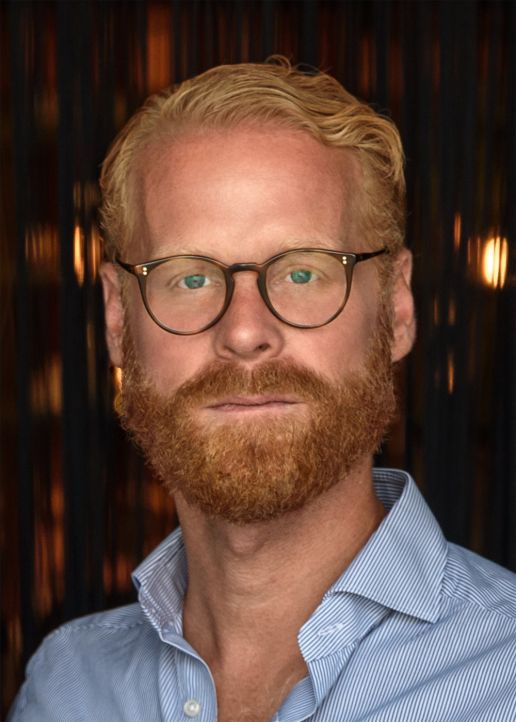
”Despite all our efforts we now had to make the difficult but unavoidable decision to cancel MUNICH FABRIC START and BLUEZONE from 1 – 3 September 2020 due to the continuing travel restrictions and further exhibitor cancellations as a result. Our priority now is to offer a special format to those exhibitors and agencies who are willing and able to present their new products on this date. With FABRIC DAYS, we offer a business focused event in Munich that concentrates on the essentials and enables the industry to work efficiently under the new conditions.”
Sebastian Klinder, Managing Director MUNICH FABRIC START
We are encouraged by the commitment, support and cooperation of a large group of exhibitors and long-standing partners who, despite the difficult situation, remain registered and have confirmed their participation in the fair.
As a partner to the industry, it is part of our philosophy to now offer a trade fair to the exhibitors and agencies who want to keep this appointment and definitely want to exhibit in Munich. FABRIC DAYS is a special event format for a limited number of exhibitors in four halls of the MOC, taking into account the applicable safety and hygiene measures.
FABRIC DAYS from 1 – 3 September 2020 in Munich presents a business focused format which is reduced to the essentials and designed to stabilise and support the industry in the return to business. Thus, the MUNICH FABRIC START team will continue to pursue the goal of providing the industry with a valuable and positive impulse.
You will find all information about the event on the FABRIC DAYS homepage here.
FABRIC DAYS Autumn.Winter 21/22: 1 – 3 September 2020
VIEW PREMIUM SELECITON Spring.Summer 22: 8 – 9 December 2020
MUNICH FABRIC START Spring.Summer 22: 26 – 28 January 2021
We’d Love To Host You Again Soon

As a partner of the industry, we would like to offer you a perspective and provide a platform with optimal conditions as quickly as possible. We hope to see everyone in Munich again soon. We are currently doing everything we can in order to achieve this.
And when we say “we”, we mean the strong community of all our lovely exhibiting brands and manufacturers, the inspiring visitors coming from around the globe and the whole team of ours. Stay strong and above all healthy – it is only together that we can master this challenge.
Understanding Sustainable Manufacturing: Our Icon System
UNDERSTANDING SUSTAINABLE MANUFACTURING: OUR ICON SYSTEM
Introduced for the first time at the latest edition of Munich Fabric Start in February 2020, our icon guidance system became a welcomed and essential tool for the professionals visiting our trend forums. Saving time and streamlining the search process, our guidance system has been developed to accompany trend forum fabrics, trims and products to quickly and clearly communicate sustainable properties and technical functions. The response to this system has been hugely positive, based on feedback received at the show.
Take a look at the system in action at our trend forums:
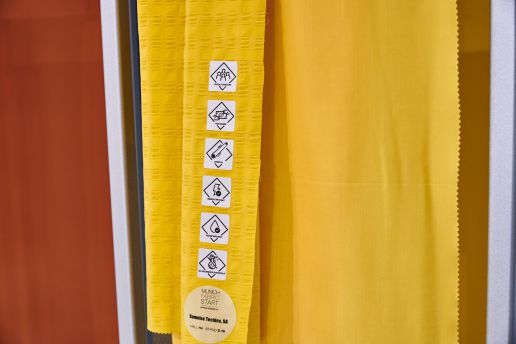
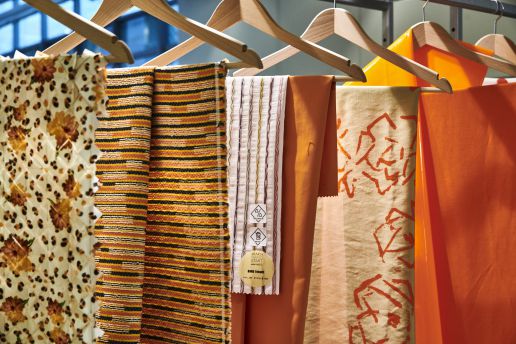
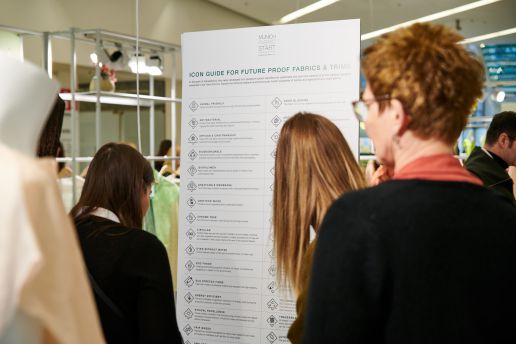
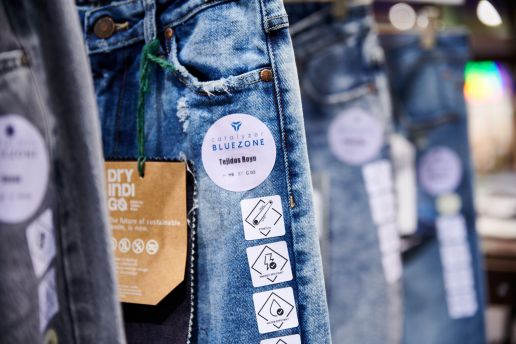
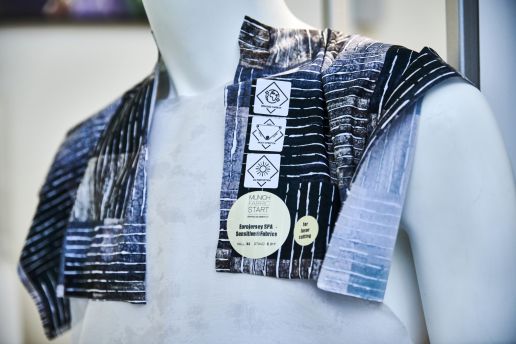
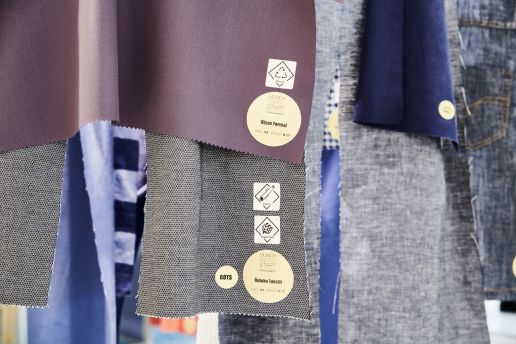
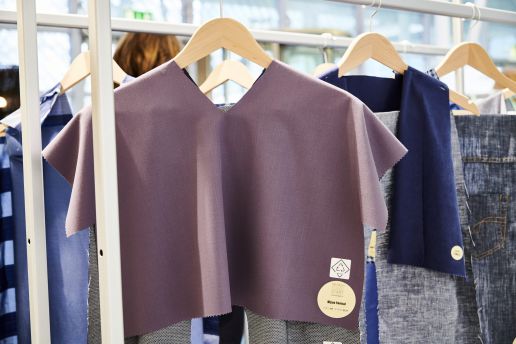
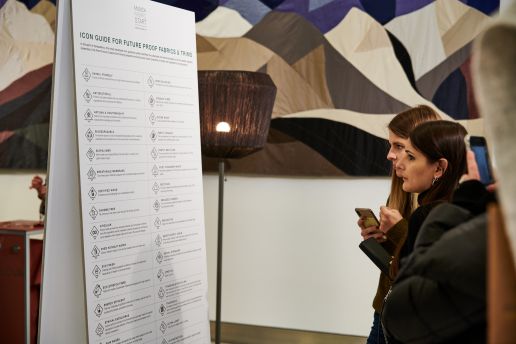
Each of the 44 icons indicates a specific characteristic related to the sustainability or performance of the respective product. With the help of these icons, manufacturers can highlight the added value of their products and at the same time make it easier for interested buyers to navigate through the increasingly vast range of products on offer.
With our new icon guidance system, we are highlighting the interface between contemporary aesthetics and invisible but important advanced product features. In doing so, we see MUNICH FABRIC START neither as a certification body nor an audit agency – for the given classification, we rely on the information and honesty of the respective supplier of the corresponding samples. We are thus taking an important step towards information, transparency and responsible action in the interest of the industry.
Jo Baumgartner, Fabrics & Trends MUNICH FABRIC START
In this sense, all specific properties such as eco-labels, social standards, performance indicators, limit values, chemical ingredients, etc. must be verified again with the respective provider.
Fashion Revolution at Munich Fabric Start
Since Fashion Revolution started, consumers, activists, brands and businesses have used their voices to demand change from the fashion industry to ensure fashion is made in a safe, clean and fair way. In our position as an industry platform we are able to convey the significance of this movement to our community of fashion professionals but also to our global network of manufacturers and suppliers operating in the textile and fashion industry.
At previous editions of our shows we reached out to our exhibitors to get involved in the viral movement #WHOMADEMYCLOTHES and send us photographs of their team responding to the question ‘Who Made My Fabrics, Trims, Prints and Denim?’. Displaying these in our busy trend and entrance areas helps send a powerful message to our audience and communities that these businesses are prepared and willing to support this Fashion Revolution movement leading to greater transparency and traceability throughout the supply chain, from fiber all the way to the end consumer.
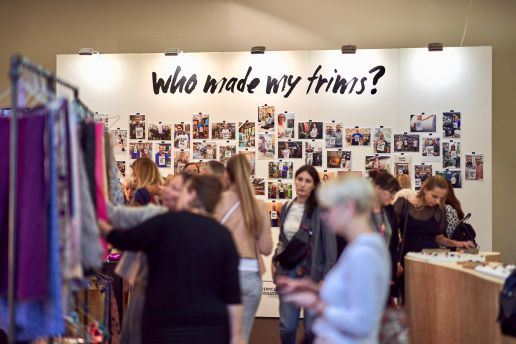
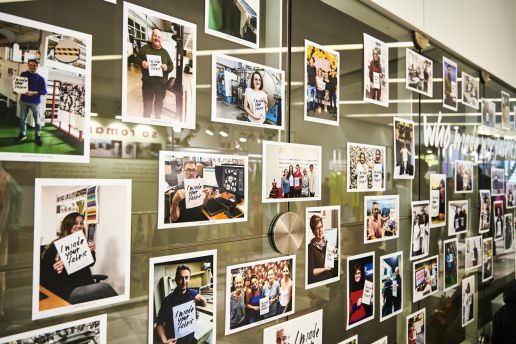
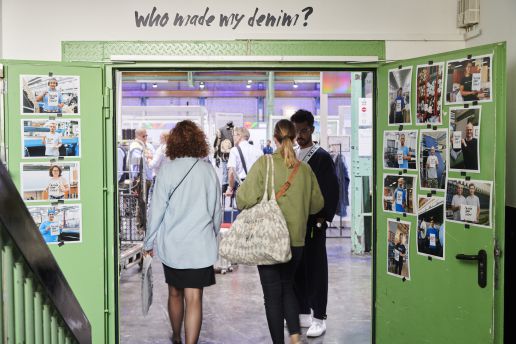
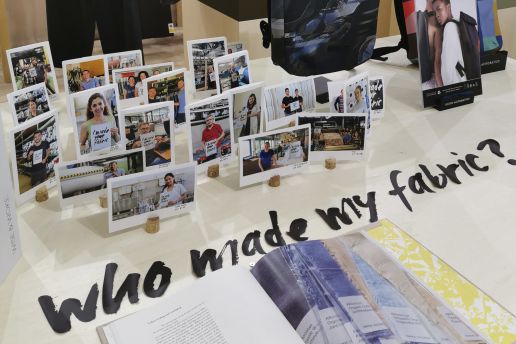
Sustainability in the textile and fashion industry is hugely multifaceted therefore the aim at our events is not only to provide a platform to promote new sustainable technology, material and fibre innovation but also to provide the necessary resources and educational tools to encourage and support the growth of sustainable processes and practices. Find out how we are creating future with KEYHOUSE, our hub for innovation at Munich Fabric Start.
The response at our shows has been overwhelmingly positive and exhibitor involvement has been a great success which we hope will continue to grow season after season. Once again, #WHOMADEMYCLOTHES will be featured in the trend areas and entrance ways at the upcoming MUNICH FABRIC START and BLUEZONE shows in September 2020. Read the latest news on our event planning during these times of Covid-19, here.
FASHION REVOLUTION WEEK
Fashion Revolution Week 2020 will shine a light on the steps needed to bring about revolutionary change at this pivotal point in the history of the fashion industry. Now, more than ever before, the industry is coming under increasing scrutiny and millions of people around the world are expected to participate in Fashion Revolution Week as it moves online. Find out how you can get involved now.
How Automation Will Change The Fashion Industry
SPORTSWEAR INTERNATIONAL TALK
DON’T BE AFRAID OF ROBOTS – HOW AUTOMATION WILL CHANGE THE FASHION INDUSTRY
In the February edition of Keyhouse at MUNICH FABRIC START, Sabine Kühnl, Editor-in-Chief at Sportswear International, hosted a panel about “Don’t be afraid of robots! How automation will change the fashion industry”. Five leading experts offered their unique insights into automation, digitalization and localization – which are currently some of the key trends driving the global fashion market.
With Ebru Ozaydin (Artistic Milliners), Jon Zornow (founder of Sewbo), Dr David Schmelzeisen (Research Associate of ITA, RWTH Aachen), Dr. Thomas Fischer (Head of Research at ITF Denkendorf) and Benjamin Baumann (Project Manager at Kuka).
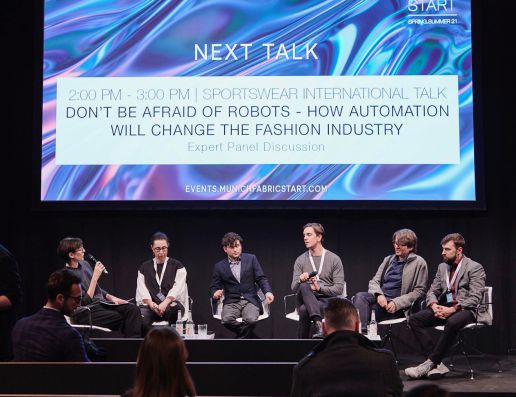
Don’t be afraid of robots! How automation will change the fashion industry
As we move closer towards a fashion system which resembles Industry 4.0, the five experts offered their insights into our current status and the role of automation, digitalization and localization.
Are we operating in times of Industry 4.0?
In terms of the classic, mass production of our fashion systems, our panellists agreed we are not fully digitized yet. Where Industry 4.0 is concerned, it has a lot to do with digitization and digital product development and simply the necessary steps have not been integrated throughout all areas of the production chain. Fischer estimates the progress among the various fragments of the fashion industry only reaches a maximum of 50%, with Baumann also suggesting that if we break down the many subtopics, we are making greater progress in some areas than others.
What then is the greatest challenge facing our industry?
Industry 4.0 relies on the exchange and sharing of data, which is currently still a problem for our fashion industry which is greatly fragmented. Where progress is often stunted due to manufacturers working conservatively instead of as part of a community which makes sharing and accessing data difficult. Collecting and processing data at all stages plays a vital role for Ozaydin, in order to bring more information about the production into the hands of the end consumer. With greater investment in automation technology, linking systems together in this way Zornow elaborates will make data sharing infinitely more efficient and available.
Is there a role textiles can play as part of Industry 4.0?
Textiles can be distinguished as part of the network where clothes can play an essential role in communication with its environment and the wearer. Through various integrated CPS’s (Cyber Physical Systems) such as sensors and antennas, textiles can become extremely useful materials for Industry 4.0 as well as a lot of other sectors. We explored this topic in greater detail with The Nurture Room project by fashion technology expert Pauline van Dongen also at the Keyhouse.
Will there always be a place for humans in fashion and textile manufacturing?
Through greater collaborative efforts and research into digitization, it will be possible to drive down the initial costs of automation which would lead to increased investments into automating processes. However, these will be non-value adding tasks and currently cannot replace the labour-intensive processes carried out by human beings. Schmelzeisen typically advises that 40% of production should be digitised but views the future of robots in the fashion industry as a collaborative relationship, where robots are brought in to assist workers and provide relief in difficult or strenuous tasks. Repetitive or mundane processes can be out sourced while increasing focus on value adding tasks only achieved by humans. There will be more jobs which evolve are suited to the human nature, their creativity and craftsmanship also in the development and management of these processes.
What is the role of localization in this new fashion system?
With global trends indicating that labour costs are set to increase in the conventionally ‘cheaper’ countries, this could make the higher investment costs of automation technology more feasible. At the same time, from a sustainability point of view, there will be an increase in companies operating regionally where materials can be processed and recycled locally. With solutions such as nearshoring, micro factories and smaller production centres offering attractive alternatives in times of political and environmental uncertainty. Also offering a solution to the high demand for personalisation and bespoke design services at the point of manufacturing, leading to the invention of new, customised technology and automated processes scaled to these new production processes. “Everything that can be digitized will be and everything that can be digitized can be personalised.” – Dr Thomas Fischer
Want to know more? Watch the full discussion now available on our YouTube channel.
A Message From Us
During this difficult and uncertain phase, the thoughts and sympathy of the entire MUNICH FABRIC START team are especially with people who live in countries without a functioning healthcare system or facing evacuation. We are aware of the impact on the global textile industry and see the great challenges our industry has to face.
As trade fair organisers, the current situation also prevents the heart of our business: bringing together people and exchanging information in the industry. We are aware of the great importance and relevance of our trade fair for manufacturers and fashion companies.

In this situation, the next meeting and exchange of ideas will become incredibly important. We want to set an example by offering a perspective and providing the textile industry a platform with optimal conditions as soon as possible. To achieve this, we remain flexible in our actions and are prepared to respond to any future developments. We are currently organising the next fair as usual and are working at full capacity to ensure that MUNICH FABRIC START in September 2020 can take place on the planned date.
The current time of isolation and social distancing affects all players in the industry which is why coming together at the fair will be immensely valuable. This is confirmed by the usual high number of registrations and positive feedback we are currently receiving. BLUEZONE is already fully booked for September 2020 and we are stunned by the great amount of trust and loyalty placed in us.
At this point in time, it is still too early to make a final statement on the execution of the trade fair. Should there be any changes, we will of course inform you as soon as possible. We are in close contact with other trade fair organizers and rely on the findings of experts and political decisions, without our own interpretations or statements on the current social and political issues.
There are still several months until our trade fair date – valuable time which can be decisive. For the moment, it means waiting for developments in the next few weeks and making decisions on this basis. At this point, we also try to put ourselves in the position of the exhibitors and visitors to find solutions which are best for all parties involved. To this end, we are currently examining various scenarios with which we can react flexibly and in a solution-oriented manner to any changes in government guidelines for events.
We look forward to hopefully welcoming you in Munich soon again. As usual, please don’t hesitate to contact us. In this special time, dialogue is particularly important to us.
Stay healthy!
Your MUNICH FABRIC START team
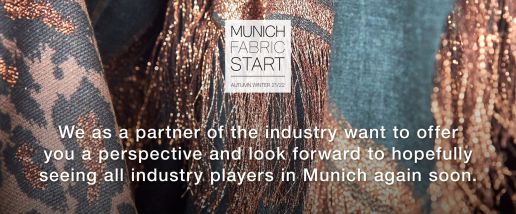
Ask The Experts
Taking into account the focus on sustainability and innovation driven by THRIVABILITY, a new information concept has been integrated into the Trend Forum at the MUNICH FABRIC START Spring.Summer 21. At various communication islands in the foyer of the MOC, industry experts have provided impulses and answers to current questions, from the origins of the material to exploring the diverse range of production processes and end garment recycling.
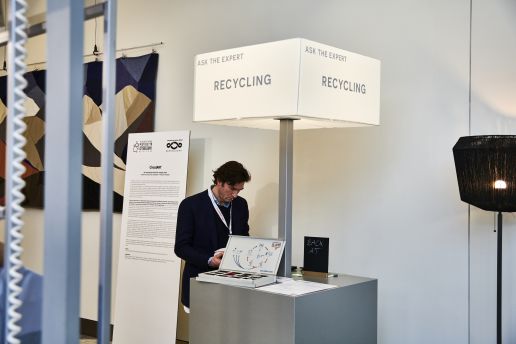
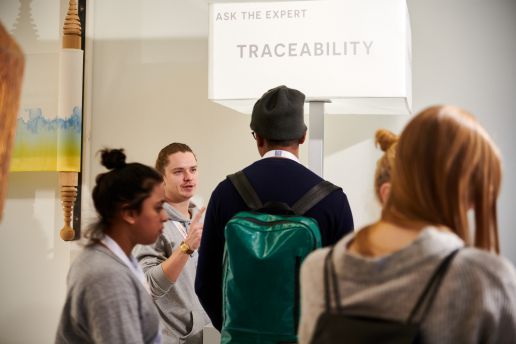
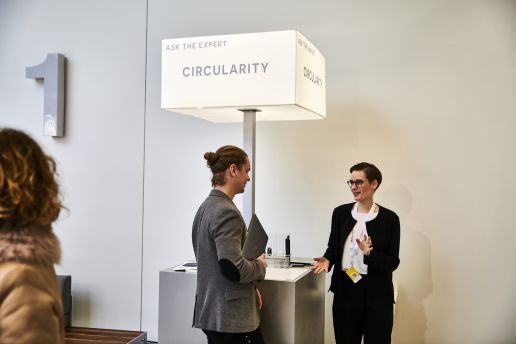
Through direct discussions, visitors gained valuable know-how, insights into topics and current solutions for both sustainable and innovative processes along the value chain:
CIRCULARITY // FIBERS & MATERIALS // MARKETING & COMMUNICATION
RECYCLING // RESPONSIBLE PROCESSING // SOCIAL RESPONSIBILITY // TRACEABILITY
We would like to thank all experts who shared their knowledge and experience with the visitors during the three days of the MUNICH FABRIC START:
CIRCULARITY
Ina Budde | Circular.Fashion
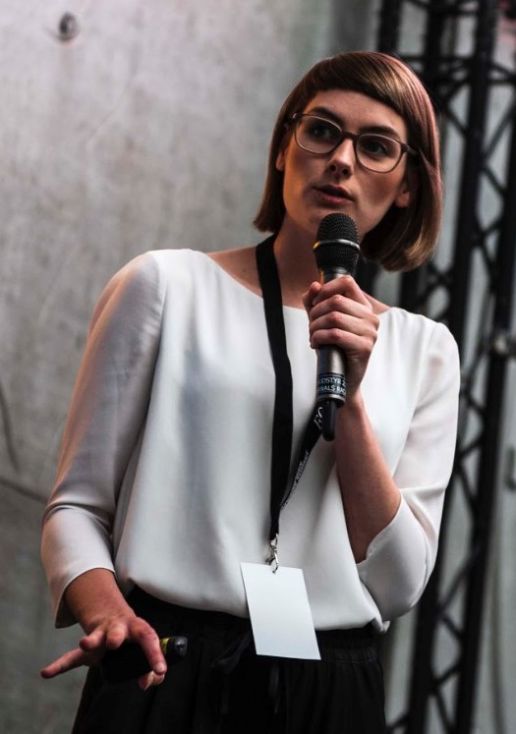
The future thinking designer Ina Budde (MA Sustainability in Fashion) is lecturer, entrepreneur and co-founded circular.fashion. Since 2013 she is working with circularity in fashion and textiles and in 2017, she founded the sustainable change agency circular.fashion together with the business developer Mario Malzacher. Additional to her work with circular.fashion, where she consults fashion brands such as HUGO BOSS and H&M, she gave workshops and lectures for sustainable design at several international universities such as RMIT Melbourne, KEA Copenhagen, RCA London, HAW Hamburg, ESMOD and AMD Berlin. Ina Budde is founding member of the global Open Source Circular Economy association and co-initiated in this frame the first Circular Textile Challenge Berlin. Her work was selected as sustainable innovator 2014 by LAUNCH Nordic and received the NEXT ECONOMY AWARD 2015 and the Global Change Award by the H&M Foundation 2019.
circular.fashion is a sustainable change agency creating product- and system innovation for a circular economy in fashion and textiles. The Circular Design Software supports fashion brands to design circular and sustainable products in a lean and efficient process, with the access to an extensive material database. With the circular.fashion system powered by the circularity.ID, a scannable label in the garment, all actors within the value chain are interconnected by giving each garment an identification, making sure that every step of a garment’s life cycle positively influences circular systems of fashion – so that the products of today become the resources of tomorrow. This system has been selected as one of the sustainable innovations 2014 by LAUNCH Nordic and received the NEXT ECONOMY AWARD 2015. Collections developed with the Circular Design Software received the lavera Green Fashion award 2015 and the Bundespreis Ecodesign Award 2017.

EXPERT INSIGHTS ON:
> Circular Materials: Identify recycling opportunities for your textiles and products
> Design for Longevity and Cyclability: Create products of endless value
> circularity.ID Open Data Standard: Leveraging data and technology for circularity
> Recycling partner network: Enable a reverse supply chain for fibre-to-fibre recycling
> Full Cycle product journey: Capture the products value through recommerce & recycling
Contact: info@circular.fashion
FIBRES & MATERIALS
Thomas Stegmaier | DiTF
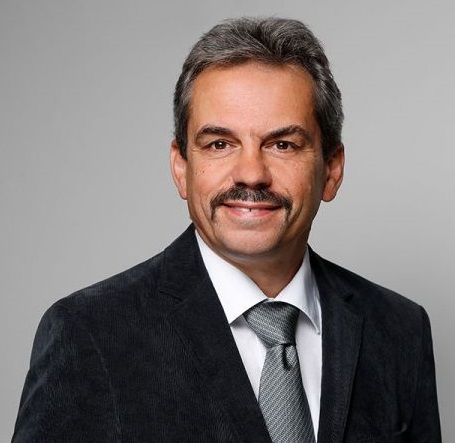
Thomas Stegmaier is Development Manager in research at the DITF (Deutsches Institut für Textil- und Faserforschung Denkendorf). After studying Textile Machine Construction and Control Technology of Machine Tools, he received his doctorate in Process Engineering at Stuttgart University. He then received his postdoctoral lecture qualification in Construction Engineering at Institute for Technology Karlsruhe. Since 20 years now, he works as Development Manager for technical textiles, surface technology, environmental technologies, bionics at DITF.
The DITF (Deutsches Institut für Textil- und Faserforschung Denkendorf) forms the largest textile research centre in Europe with more than 300 scientific and technical staff. As the world’s only textile research facility and covering an area of more than 25,000 m², the DITF work right across the textile production and value chains. Since 1921, they have been across all the major fields within textiles. They are among the leading research institutions worldwide.
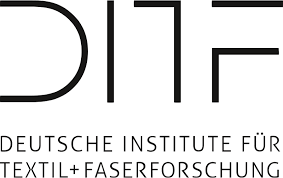
EXPERT INSIGHTS ON:
> What does organic really mean for textiles?
> Limitations of natural fibres
> Ways of recycling textiles
> Composites: Pitfalls for recycling
Contact: info@ditf.de
MARKETING & COMMUNICATION
Alex Vogt | KERN. Consulting
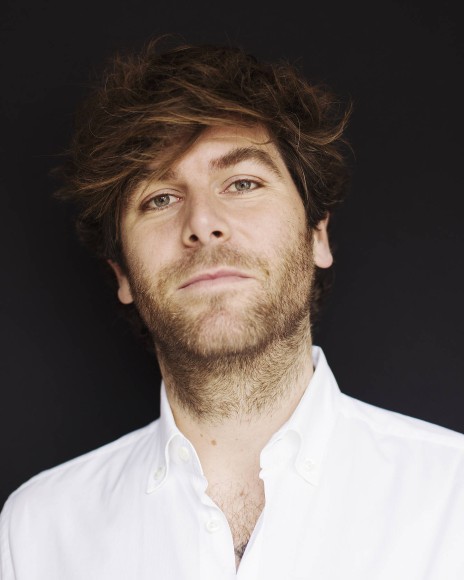
Communications and strategy consultant Alex Vogt sees the complex of innovation management and corporate responsibility as an essential prerequisite of future-orientated business thinking. He initially studied politics and history at the Goethe University Frankfurt and then came into contact with the sportswear and fashion industry through the surf and skateboard scene, going on to gain an MBA specialising in the textile industry at the private LDT Nagold Academy for Fashion Management. Before joining the communications consultancy KERN as a partner and devoting his full attention to the topics of innovation and CR, Alex Vogt held senior positions in fashion retail and marketing.
KERN. designs individual solutions to communicate forward-thinking business content. Go with the flow, let your mind wander and immerse yourself in a new world… KERN. is a strategy and communications consultancy with a focus on innovation and corporate responsibility. KERN. supports companies in the development and implementation of strategies, as well as working as communications consultants and journalists and creating complete graphic design packages. Its clients include companies from the retail and manufacturing sectors, associations and trade shows.

EXPERT INSIGHTS ON:
> Hot Spot- / Impact Analysis; Distinction
> Corporate Responsibility Language
> Moderation of Stakeholder Dialogue (B2B)
> Sustainability Reporting (Text, Layout, Production)
> Communication Concepts & Implementation (internal & external)
> Marketing, Campaigns & PR (B2C)
Contact: hello@kern.consulting
RECYCLING
Paul Doertenbach | I:CO

Paul Doertenbach is Head of Marketing and Sales at I:Collect GmbH, the parent company of I:CO. He joined the company 9 years ago after completing a bachelor at Munich Business School, and a MBA at University of Buckingham.
Restorative and regenerative by design, a circular economy industry approach can lead to positive change. Pre-loved clothing and shoes would circulate in closed product and material cycles and be used continuously in the manufacturing of new products. At I:CO, we are committed to this vision. Our innovative take-back system is helping make it a reality and is used successfully by many companies around the world today.

EXPERT INSIGHTS ON:
> Textile Recycling Today and Tomorrow
> End of Life Procedures
> Change Process
> Fibre 2 Fibre
> Closed Loop / Open Loop Recycling
Contact: info@ico-spirit.com
RESPONSIBLE PROCESSING
Tobias Glatt & Fabian Walda | bluesign® ACADEMY
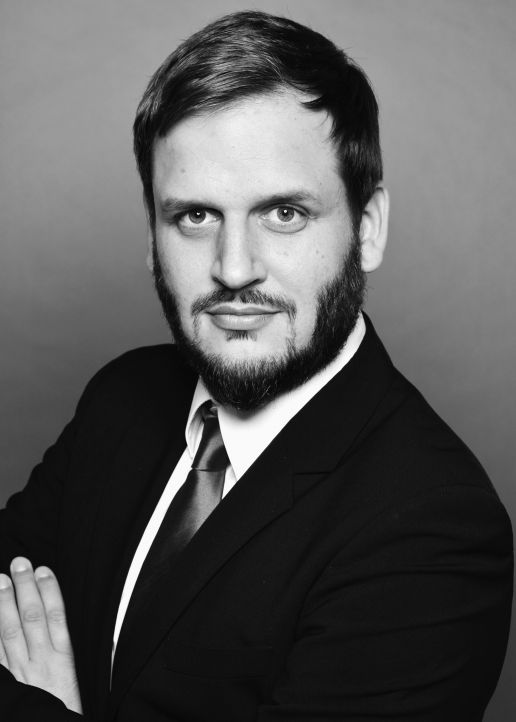
Tobias Glatt is Geographer, Auditor Integrated Management Systems and Energy Management Systems. He works for bluesign since 2009 in different roles and conducted more than 60 audits around the globe with focus on Environment, Health & Safety in textiles and accessories companies. Besides, he follows several sustainability projects, e.g. carbon footprinting, water footprinting and recycling.
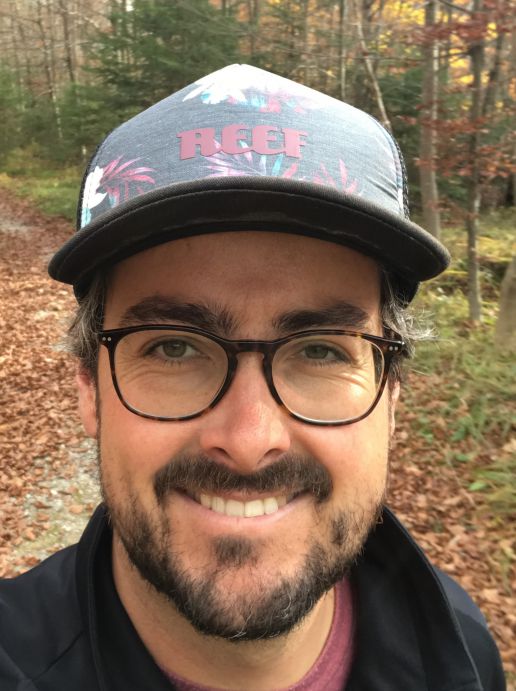
Fabian Walda is Dipl. Ing. In Textile and Clothing Technologies. Since 8 years, he is active at bluesign in technical orientated fields such as audits, international audit supervision and field trainings and lastly R&D projects around sustainable manufacturing.
At the bluesign® ACADEMY, we generate and disseminate knowledge on various EHS and sustainability topics in relation to textile and chemicals industry. This unique knowledge is the basis for improving and expanding the bluesign® SYSTEM as well as our services to stakeholders and the community: Training and lectures, support and customized solutions, consultancy, studies and projects as well as further development of the bluesign® CRITERIA and substance restrictions.

EXPERT INSIGHTS ON:
> Chemicals Management
> Resources, Consumer Safety
> Best Available Techniques and/or Environmental Friendly Processes
> Occupational Health & Safety
SOCIAL RESPONSIBILITY
Mark Starmanns | BSD Consulting
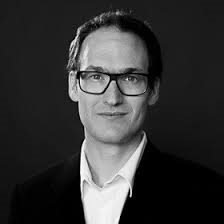
Mark Starmanns works as senior consultant at BSD Consulting Switzerland. His specialist areas are sustainable strategy, sustainable supply chain management, sustainability standards and living wages. He has been working on the topic of fair fashion in research and practice for more than 15 years. Besides working as Sustainability Consultant at BSD Consulting, he received a PhD on corporate responsibility in global clothing supply chains and is the co-founder of the fair fashion information platform GET CHANGED!
BSD Consulting – business. sustainability. development – founded in Switzerland in 1998, we are an international network of consultancy firms providing knowledge and solutions for sustainable development. BSD is now part of ELEVATE, the leading business risk and sustainability solutions provider.
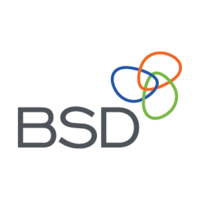
EXPERT INSIGHTS ON:
> Do I need a social Code of Conduct?
> Which social standard is the right one for me?
> Is it enough to outsource monitoring of my social standards?
> I produce in Europe – do I need to care for social standards?
> How do I implement living wages?
> How do I do a human rights risk assessment?
TRACEABILITY
Philipp Mayer | retraced
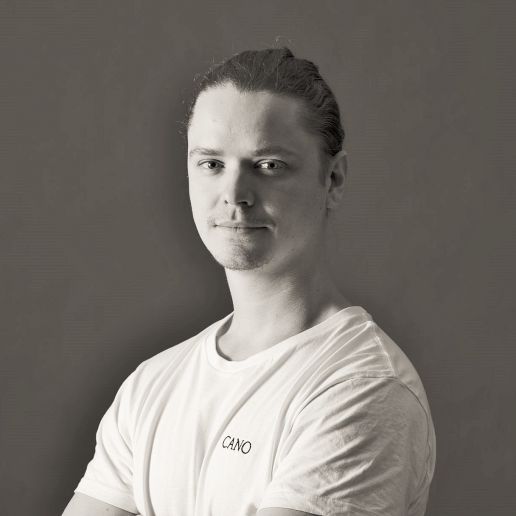
Philipp Mayer is the Co-Founder of retraced and the footwear brand CANO. He lives the entrepreneurial spirit: Directly after graduating from Fontys International Business School in Venlo, the Netherlands, he co-founded the CANO Clothing Company in 2016 and two years later the transparency platform retraced.
Little is known about how our favourite clothing items are made, under what labour conditions, which raw materials are used, and how the process is affecting our planet. End-consumers across the globe are starting to demand reliable, verified supply chain information in order to make educated choices about the products they consume. Retraced is a blockchain-powered transparency platform that allows brands to unlock relevant supply chain information and share their verified efforts in sustainability and ethics with their consumers.

EXPERT INSIGHTS ON:
> Supply Chain Transparency
> Blockchain Verification
> Sustainability
> Consumer Trust
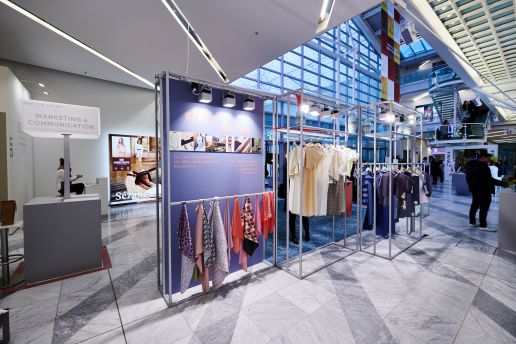
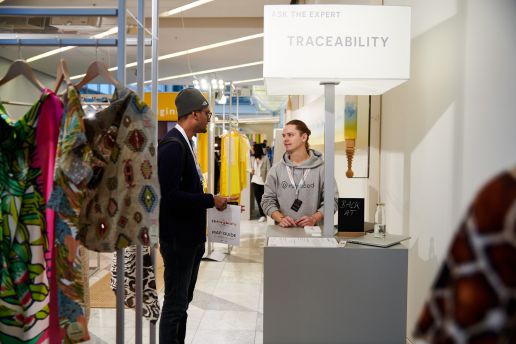
CirculART – A Holistic Approach to Sustainability
The project CirculART is the result of 10 months of cooperative work by a group of companies that can be defined as representatives of the sustainable textile production chain, from yarns to the final product and accessories.
Those organizations have chosen to embrace the idea of sustainability and decided to evolve their businesses in an innovative and far-sighted way. Four invited artists have metaphorically inserted themselves between the warp and weft of the life cycle of clothing and turned themselves into an intersection point through which the public can observe the textile production processes, creating different attitudes towards the products we buy.
The aim of the project is to bring artistic research to question the different processes constituting the textile production chain.
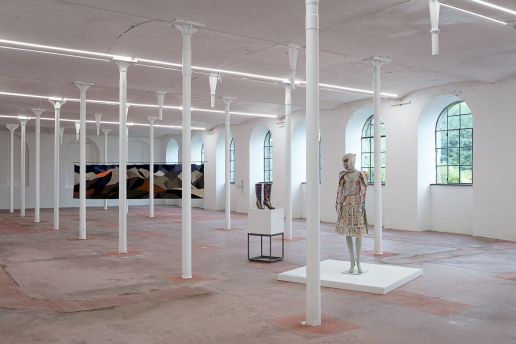
We believe that the artworks which emerged from this project could have an interesting different point of view on sustainability in the textile industry: the artworks should be seen as a way to start a conversation about the relation between production and its various impacts – on the landscape and “local” communities, natural resources, production and labour in the global and local market, the usage of raw materials and the item of clothing in its symbolic value.
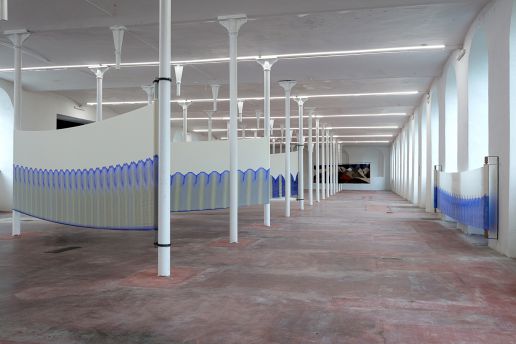
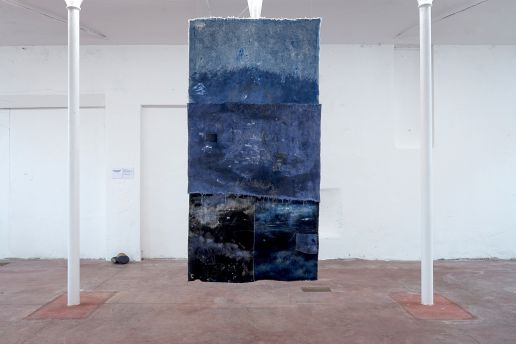
In the development of the artistic project, the four artists have investigated in depth the textile production processes, not focusing on a single phase but considering the meaning of sustainability in the whole textile supply chain: Starting from the use or reuse of raw materials like wool, wood, cotton, used garments and production leftovers to garment finishing and the production of accessories like labels and zips. They have engaged with people who – for each company involved – explained in detail the production operations, the use of natural resources like water, woods and pastures as well as the relationship between production and globalisation. The project is inspired by the idea of circularity, being a basis for discussion about the textile and fashion production. With the intention of making the importance of the supply chain visible – through the artistic thought – but also to question the role of the consumer.
Companies: Brugnoli Giovanni S.p.A., Filatura Astro S.r.l., Lampo – Giovanni Lanfranchi S.p.A., Lanificio F.lli Cerruti, Lenzing Group, Officina +39, Ribbontex S.r.l., RGT Ready Garment Technology Italia, Tessuti di Sondrio.
Artists: Laura Harrington (UK), Silvia Giovanardi (IT), Juan Manuel Gomez (COL), Emanuele Marullo (IT)
Curated and produced by Cittadellarte – Fondazione Pistoletto (Biella – IT)
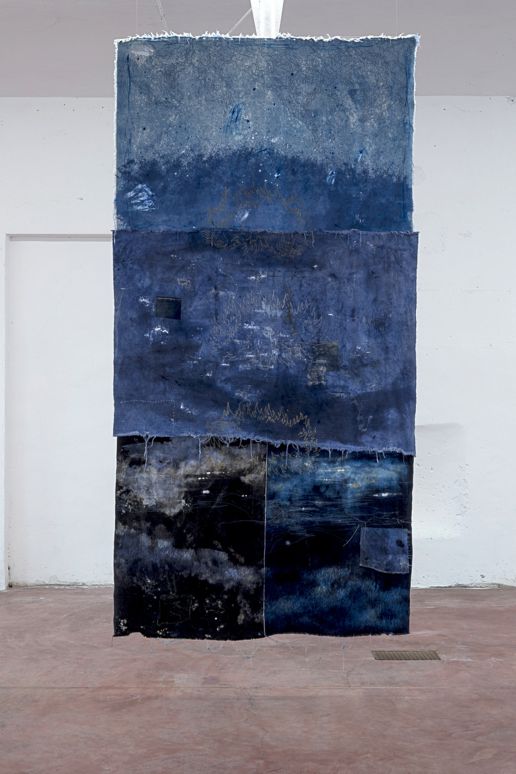
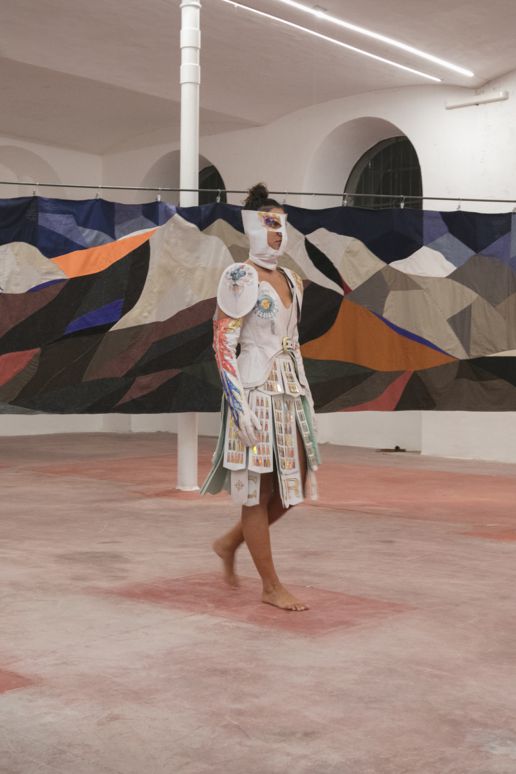
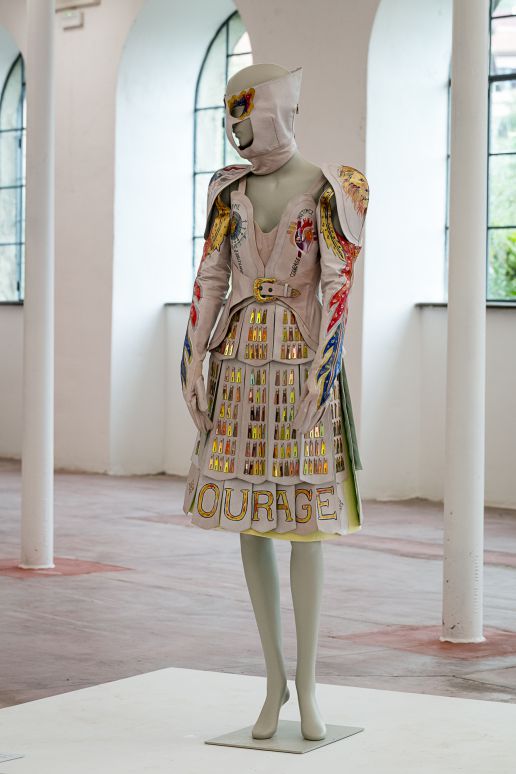
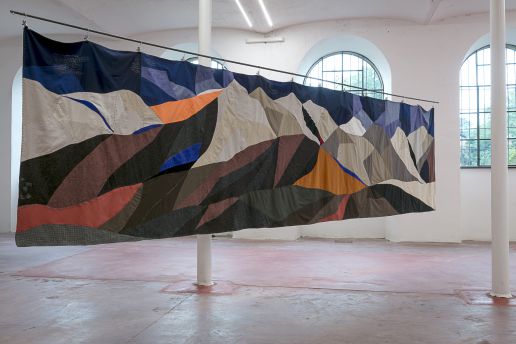
Further information about the upcoming shows for 2020 can be found here.
VIEW PREMIUM SELECTION: 14. – 15. July 2020
MUNICH FABRIC START: 1. – 3. September 2020
BLUEZONE: 1. – 2. September 2020
Focus On Thrivability at MUNICH FABRIC START Spring.Summer 21
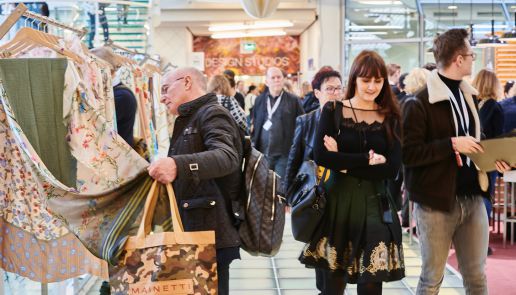
A PARADIGM SHIFT TOWARDS HOLISTIC SUSTAINABILITY
A new level of sustainability, digitalisation, transparency, a growing need for information and the desire to inspire - that's what the Spring.Summer 21 season stands for
The MUNICH FABRIC START with BLUEZONE, KEYHOUSE and the individual showcases presented by around 1,000 international suppliers of fabrics and additionals successfully introduced the Spring.Summer 21 season from 04 – 06 February in Munich. The approximately 18,400 international trade visitors were offered a broad spectrum of strongly positioned collections with innovative product and trend statements that demonstrated a new awareness of ecology and the increasing relevance of natural looks and resource-saving materials.
The MUNICH FABRIC START has shown very clearly that this fair format is convincing as a strong industry platform in times of changes and major challenges. Thanks to the professionalism and sovereignty of all those involved, the necessary responsibility to approach the reorientation of the market constructively and in a solution-oriented manner has been created. We have experienced this willingness in numerous discussions with exhibitors and visitors during the three intensively used days of the fair. We therefore feel confirmed in our current and future orientation.
Sebastian Klinder, Managing Director MUNICH FABRIC START

The design team of Boss Women emphasizes not only the good atmosphere but also the high-quality and quantitative offer:
We enjoy the relaxed atmosphere here in Munich. All the important suppliers are on-site, so we can work excellently. The main topic is of course sustainability and the correspondingly wide range of natural materials such as linen as one of the favourites for summer 21. There are also very innovative jerseys, bondings and neoprene knittings as new and exciting materials.
This was also confirmed by Theresa Austin, Advisor AKOJO MARKET, Co-founder Paris UIUX, LVMH Group Digital:
I thoroughly enjoyed my time at Munich Fabric Start. The Bluezone and Keyhouse, in particular, were eye-opening for me and I was very impressed at the number of suppliers working with innovative new technologies and methods to produce in more sustainable ways. It was a great showcase of sustainable innovation and it was very inspirational to speak with so many experts on such a key topic. I left both motivated and educated, with a lot to share back into my work.
Further background information on the main theme, the innovations of the season and the trade fair highlights can be found on our HOMEPAGE and in the PREVIEW PRESS RELEASE. High-resolution pictures can be found in the PRESS GALLERY.
FOCUS ON THRIVABILITY
The guiding theme THRIVABILITY met the current mood of the industry, in which future-oriented entrepreneurial spirit meets enthusiasm and a changing understanding of values.
In Munich, it became very clear that the era of sustainability is currently determining all talks and discussions in the textile industry. The tenor seems unanimous: The industry is on the right track and now it is time to take responsibility, turn information into action and create transparency.
Claudia Lanius, Lanius, highlighted the positive approach to a new form of open-mindedness:
The largest portfolio of sustainable products is on display here in Munich. Such a broad spectrum in this density cannot be found anywhere else. All major suppliers are on-site. In addition, there is an excellently staffed accompanying program of panels and discussion rounds. The acceptance of sustainable topics is increasing all the time, which is a very positive development overall. This is also reflected in the competent awards for articles in the ReSOURCE Area.

The increasing interest in sustainability, certifications and future-relevant topics confirms Franziska Dohrmann, GOTS:
Our contact to major brands is clearly increasing and the interest in certified articles is growing. Already on the first day of the fair, we recorded a strong visitor frequency with very good discussions. The increasing acceptance is also reflected in the highly attended lectures of the ReSOURCE Forum.
INFORMATION, RESPONSIBILITY AND TRANSPARENCY IN DISCUSSION
The different aspects, innovations, collaborations and communication concepts were also the focus of the numerous well-attended side events at KEYHOUSE, the ReSOURCE Area and BLUEZONE.
As a trade fair organiser, we also see ourselves in the role of an impulse generator that can generate a corresponding reach. Therefore, we attach particular importance to a qualitative and varied supporting programme which, thanks to international experts, offers an insight into current innovation topics, problems and solutions and thus forms the basis for transparent knowledge transfer.
Frank Junker, Creative Director MUNICH FABRIC START
Right at the start on Tuesday morning, trend forecaster David Shah addressed precisely these challenges in his enthusiastic Keynote „The 10 Design Pillars of Design“. The publisher and CEO of View Publications drew scenarios of new retreat possibilities and the search for structures and simplicity in times of digitalisation and diversification.
The panel discussion on the subject of “Future Textile Supply Chain” with international experts also provided new thought-provoking impulses on how the textile chain can be transformed through sustainable solutions and networking. In addition to transparency, intensive communication with consumers and the development of technologies, product development, quality and aesthetics should not be forgotten as indispensable criteria.

The textile value chain is currently being radically rethought. Every company has to deal with these impulses and develop individual concepts. One thing is certain: in the future, too, only those companies will be successful whose fashion fascinates and who act in an economically sensible manner. Digital processes, decentralized production, smaller batches, shorter lead times, comprehensive transparency and new circular business models – it remains exciting to see which of these developments are scalable and when. One thing is certain: now is the right time to develop principles for dealing with the new perspectives for your own company. In view of these fascinating prospects, a 90-minute expert panel on “Future Textile Supply Chain” is just enough to scratch the surface of the new possibilities.
Alexander Vogt, Kern. Consulting
INNOVATIONS, FUTURE MATERIALS & NEW TRENDS
Knowledge, transparency, quality, responsibility and communication influence the current multitude of product and process innovations.
Linen, both pure and blended with cotton, is the big favourite for the season Spring.Summer 21. Other material innovations were super-stretch silk, recycled polyester, Ecovero-Tencel linen, Naia and Cupro fibre blends or hemp textiles – the constant reference to natural fibres and surfaces was clearly visible.
The theme of Li Edelkoort’s exclusive trend seminar underlines this statement. In her two-hour “Green Wave” lecture, the internationally renowned trend expert presented her interpretations of Spring.Summer 21. Here, too, a rethinking of natural materials and looks was clearly evident. In her outlook on Autumn.Winter 21/22, she favours White as a global colour, on which new structures, styles and designs are based.

BLUEZONE – Reject egoism. Create ECOISM. Rewrite your future
The denim industry is facing new challenges, which the Blue Community faced as an optimistic and international community at BLUEZONE under the ECOISM theme.
The strong network of over 100 major international brands and numerous denim experts was looking for answers to a conscious consumer approach and a growing interest in ready-made solutions that offer future-oriented products, state-of-the-art technological processes and complex functionalities.

Current topics that determine the denim market were discussed in depth in lectures and international panel discussions. The Rivet 50 Talk on the topic of “2020 Vision” on the first morning of the fair gave an outlook on companies, technologies and fashion in the next decade. One of the key statements highlighted the changing demands of consumers – stationary retail can only survive with new concepts, such as offering sustainable fashion, vintage, and repair stores under one roof. This is precisely why the denim community must move closer together.

Alberto Candiani von Candiani confirms that the community spirit of the ECOISM guiding theme determines the future:
ECOISM – I love the concept, the slogan, the theme of this year’s BLUEZONE. It’s about green innovations, which must be visible and tangible, and about consumers who are better informed than ever before and are looking for a new way of consuming. We, as the Blue Community, are responsible for a massive change that will transform what is considered a “polluting” industry into a green model based on sustainable innovation and circularity. Denim can be seen as the most popular, “democratic” and perhaps “invasive” fabric ever made on the planet – and we, the Ecoists, want to change denim to become the representative flag for this revolution.
KEYHOUSE – A STRONG NETWORK OF CREATIVE MINDS
The think tank of MUNICH FABRIC START offered concrete approaches for a future-oriented textile and fashion industry. Information, transparency and interaction stand for an inspiring network of innovative projects and sustainable collaborations.

Munich Fabric Start’s advanced platform, KEYHOUSE, has been paving the way into the future for some time now, connecting innovators and the industry. The innovation space, which brings together game changers and pioneers, successfully gives traditionalists in the textile industry a glimpse of the future. KEYHOUSE provides the space for superstars of fashion technology to present new technologies, sustainable developments, expert workshops and trend seminars. I would easily describe KEYHOUSE as the “Department of Innovation” for fashion companies.
Muchaneta Kapfunde, Founding Editor-in-Chief FashNerd.com
In her keynote speech “Rethinking the business of fashion”, Muchaneta Kapfunde called for a rethinking within the fashion industry. The change is possible and necessary due to the influence of digitalisation and technology. Examples of fundamental changes are block chain transparency, compostable packaging, on-demand solutions and the production of textiles based on dairy products.

In the panel discussion of Sportswear International, international experts discussed how automation, digitalisation and localisation will change the global fashion market and what impact these new standards will have on CSR issues and sourcing structures.
Once again, the SUSTAINABLE INNOVATIONS Area at KEYHOUSE, curated by Simon Angel, received great attention. He emphasized above all the openness of the visitors to the complex topics, to new materials and material extraction. He said that particularly pleasing was the willingness to exchange ideas, form networks and thus strengthen the community of all those involved within the textile and fashion industry.
The Keyhouse has a unique energetic atmosphere with very inspiring visitors. Especially exciting was the great interest in holistic sustainable concepts that go into depth. So the industry is definitely on the right track
Chandra Prakash, Founder & CEO Cocccon
The future of the textile industry was not only discussed in the seminars and lectures – the MUNIQUE MOODS party on the first evening of the fair also provided an opportunity to strengthen the community and exchange information. Around 1,500 guests gathered in an elaborately staged and specially built palace tent.



